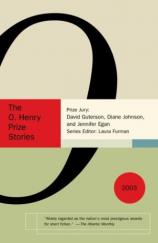The O. Henry Prize Stories 2003
Review
The O. Henry Prize Stories 2003
When noted authors such as T.C. Boyle, A.S. Byatt and Alice Munro are among the authors contributing to a collection of short stories, you know there's going to be a high level of quality. But the surprising and delightful thing about THE O. HENRY PRIZE STORIES 2003 is the amazing array of fresh, creative stories by lesser-known yet equally gifted authors. In fact, the real stars of this collection aren't Boyle, Byatt or Munro, but Robyn Jay Leff, Molly Giles and Ann Harleman, authors who write about death and emotional paralysis and all the stages in between.
The start of the book explains the roots of the O. Henry Prize, a short but fascinating read for anyone who ever exclaimed over "Gift of the Magi" in eighth grade English. Then comes the meat of the book, the stories themselves. No overarching theme or idea holds them together, beyond the ideals of good writing and fascinating storytelling.
In "Burn Your Maps," Leff's depiction of a normal family dealing with everyday things and not so everyday things (how often, really, does a 9-year-old American boy decide to become a Mongolian?) is telling in how the characters deal with their problems. Leff's deft choices of words flow from playful to serious, and the story moves to a very real, and thus not altogether satisfying, conclusion.
Harleman's and Giles's tales deal with the terminally ill, more specifically terminally ill husbands and the wives who off and on love, tolerate and/or resent them. Both authors excel at letting the reader see only a piece of a clearly drawn story, sort of like peaking into a window and glimpsing bits and pieces, being left to draw one's own conclusions. Are either of these women a bad wife or mother? Are they forced into their decisions? How do their husbands feel? We see the answer to this one in Giles's "Two Words," one of the few stories with an O. Henry-esque ending. Harleman offers many theories on how "well spouses," as the wife in "Meanwhile" so disdainfully describes them, cope. Not all are pretty, but they are at least honest.
Other standouts include Marjorie Kemper's "God's Goodness," about a young Christian immigrant who struggles with her faith in God as her terminally ill charge gets sicker and sicker; "The Story," Edith Pearlman's masterfully rendered meeting between two families of divergent sensibilities and backgrounds whose differences are crystallized by a Holocaust of one of them; and "The Shell Collector," Anthony Doerr's thoughtful meditation on colonialization, god complexes, and how sometimes a blind man is the only one who can see.
Munro's "Fathers" is the typical Munro meditation on Canadian childhood told from the perspective of a mature narrator (though it's unclear how mature). It's a good story, of course, as all of Munro's usually are. It has a feeling of quaintness and small community that many of the stories in this collection share.
Even the stories with good execution, mediocre promise and lower-than-expected return aren't actually bad. Though Byatt's "The Thing in the Forest" is among the weaker stories in the collection, its portrait of two separate yet united girls who survive World War II (and, more importantly, that thing in the forest) is haunting. Bradford Morrow's "Lush" relies on cliché too much in its construction, and yet he observes some parts of the human experience so keenly it's almost painful.
By far the best reason to read the stories in this collection, as all originally appeared elsewhere, is to read the author insights on each story upon finishing them. Each has a small section in the back, alongside his or her biography, to discuss the story presented and its meaning. For anyone who has every wondered, "How did he get there" or "What was she thinking," that's the sweetest treat of O. Henry.
Reviewed by Toni Fitzgerald on September 9, 2003



